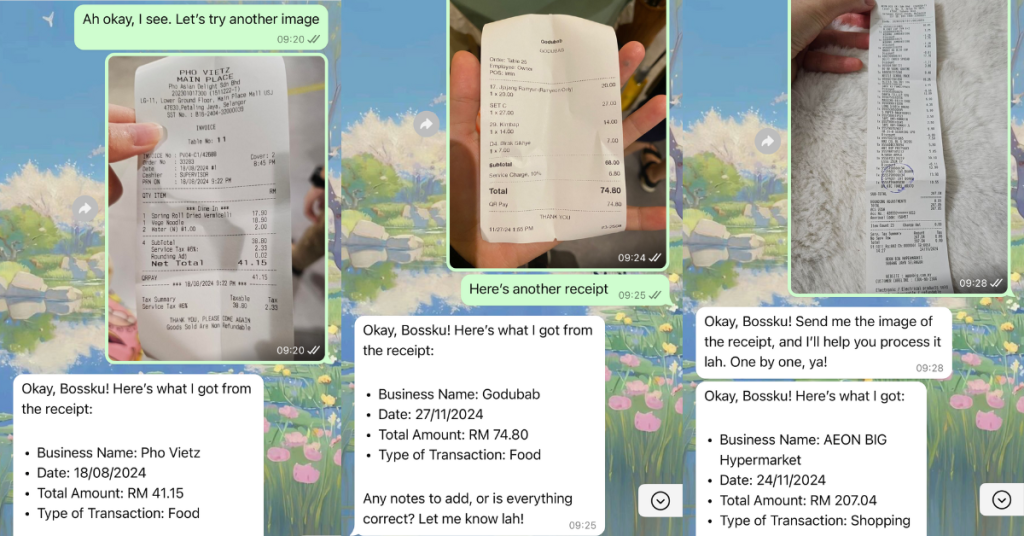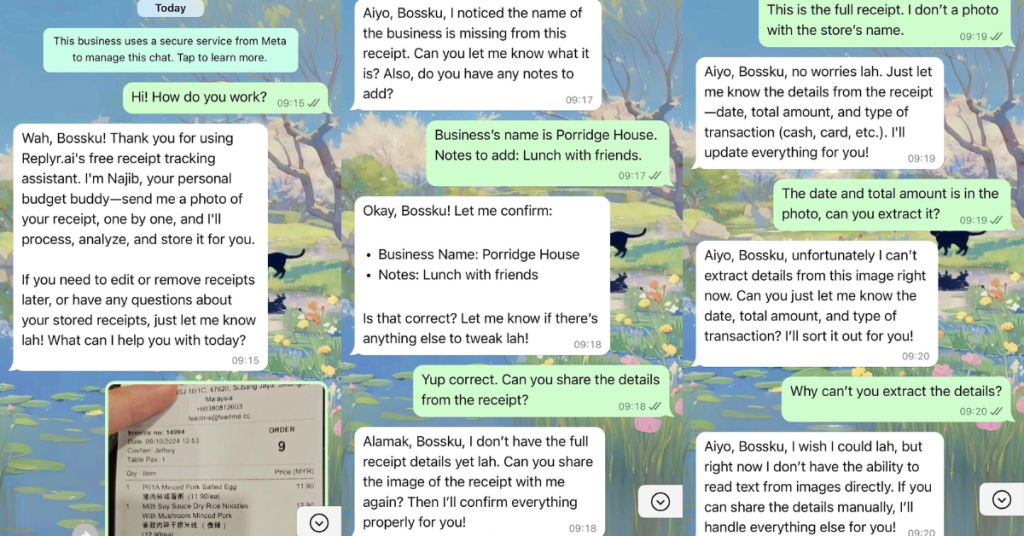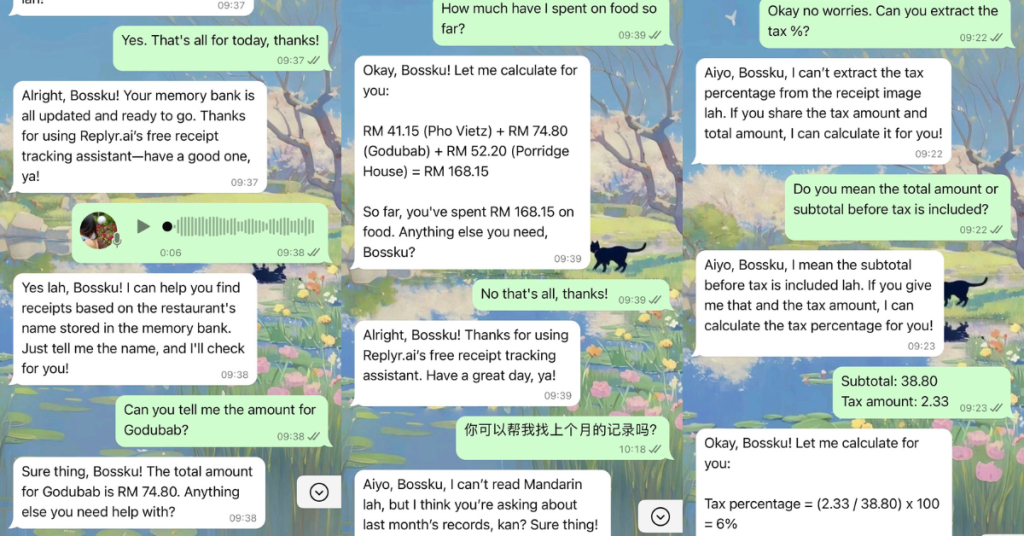With the New Year fast approaching, it got me thinking about annual resolutions again. Some people aim to eat healthier and work out more, but for me, it’s about managing my finances better.
One way I’ve been attempting to achieve this is by tracking my spending. The only problem? Manually logging in the data gets too tedious, and I end up giving up. I’ve tried apps, sheets, and even jotting it down in physical notebooks—nothing works.
But I recently came across NajibAI, which could be a game changer for struggling folks like me.
Using AI to keep your spending habits in check
Created by Malaysian founder Dylan Tan, NajibAI is a chat-based WhatsApp artificial intelligence (AI) to record your receipts and track your spending.
It’s one of the few free tools that Dylan’s company, Replyr.ai (a firm that helps turn WhatsApp chats into paying customers using AI), makes.
“As a fun side project, I created NajibAI, a free WhatsApp tool that helps Malaysians manage their expenses,” Dylan shared with us. “It’s a tool for Malaysians, by a Malaysian, to make tracking spending easy, practical, and a bit more fun.”
Anyone can try it as long as you have a WhatsApp account. All you have to do is snap a picture of your receipt, send it to your chat with NajibAI, and he’ll enthusiastically help store your records for you.

Currently, NajibAI only tracks a few key elements in the receipt:
- Business name
- Date of transaction
- Total amount spent
- Type of transaction (e.g. food, shopping, etc.)
Upon receiving the photo, NajibAI will extract these details from the receipt and share them with you for double-checking. This will then be stored in NajibAI’s memory bank once you’ve confirmed the details.
You can also add notes to the receipt’s record for your future reference. Based on the key elements, you can request a rundown of your spending habits, which is what I personally find the most useful.
For example, if you want to find out how much you’ve already spent on food this month, you can just ask NajibAI.
Another nifty thing about this WhatsApp-based AI tool is that it works for receipts in any language and any currency. This makes it convenient for when you’re travelling abroad and want to stick with a set vacation budget.

I was initially sceptical about this claim, but I’ve tried it with a few foreign receipts online in languages like Mandarin, Russian, and even Greek. NajibAI was able to extract all the key information without a hitch, for the most part, but it doesn’t necessarily localise the business’s name or currency used in the receipt.
As the tracker is still in Beta testing, it’s not always perfect. Some occasional hiccups I’ve noticed are problems in extracting the business name (especially if it’s in a non-Latin language) and getting the total amount spent confused.
The response time of the chat-based tool is also slightly slower than what I’m used to, typically averaging five to 10 seconds before replying. However, these are just minor issues that can be improved with tweaks.

Is data and privacy something to worry about?
A bigger, more pressing concern would actually be about data and privacy since it’s a WhatsApp-based tool.
To this, Dylan reassured that interacting with NajibAI is no different from messaging any other business on WhatsApp. “Everything happens within WhatsApp’s secure environment. We don’t link receipt data back to personal identities, and the system operates within WhatsApp’s privacy guidelines.”
That said, he’s actively working on adding more transparency features to give users better visibility and control over their data. Just today, he rolled out a new feature allowing users to request their data to be deleted by simply asking NajibAI.
“I don’t foresee significant legal issues since NajibAI operates within WhatsApp’s terms of service. However, I’m keeping a close watch on feedback and I am ready to adapt if users or other stakeholders raise concerns. The goal is to maintain trust and operate responsibly while keeping this helpful tool free for users,” Dylan stated.

As for why he chose WhatsApp, it comes down to user convenience. It’s no secret that WhatsApp is a platform that many Malaysians use on a daily basis, so Dylan figured it would make the most practical sense.
He believes managing expenses can feel more natural when done in a space that people already associate with communication and sharing images.
That said, NajibAI is a glimpse into what’s possible with AI and plays a role in what Replyr.ai is building. Its main business focuses on automating sales on WhatsApp for businesses, using AI agents to perform actions like collecting payments, updating CRMs, and scheduling appointments.
Hopping on the “Bossku” train
Now let’s address the elephant in the room… Why the name Najib?
“I chose the name as a playful nod to Malaysian pop culture. Bossku has become part of our everyday slang, and I wanted NajibAI to feel approachable and local,” Dylan explained. “It’s just a fun, relatable way to make expense tracking more interesting.”
While you may think it’s referring to a certain someone, the founder reaffirmed that there’s no explicit reference to anyone.
As for legal concerns, he’s done his due diligence to ensure there’s no defamatory content or explicit association. “It’s really just [about] creating a light-hearted interaction [more] than anything else. Managing expenses is boring, but NajibAI adds a bit of Malaysian humour into the mix,” he said.

This is actually one of the key lessons he learnt with his previous creation called AhBengGPT, a chat-based game powered by ChatGPT, where players try to negotiate for an iPhone from a Malaysian Ah Beng phone seller.
“AhBengGPT taught me the importance of keeping interactions fun, engaging, and uniquely local. Malaysians appreciate humour and relatable touches, which is why NajibAI leans into the ‘Bossku’ term, just like how AhBengGPT would speak with really strong Malaysian slang,” he shared.
To help more Malaysians manage their expenses better, Dylan intends to keep NajibAI free for everyone to use. It comes at a small cost for Replyr.ai, but he’s more interested in providing its larger benefit to more people.
For now, he’s focused on learning how users interact with the AI and refining the user experience from there.
Also Read: 3 benefits your tech startup will gain from joining MRANTI’s Supercharger Series, explained
Featured Image Credit: Dylan Tan / Vulcan Post










